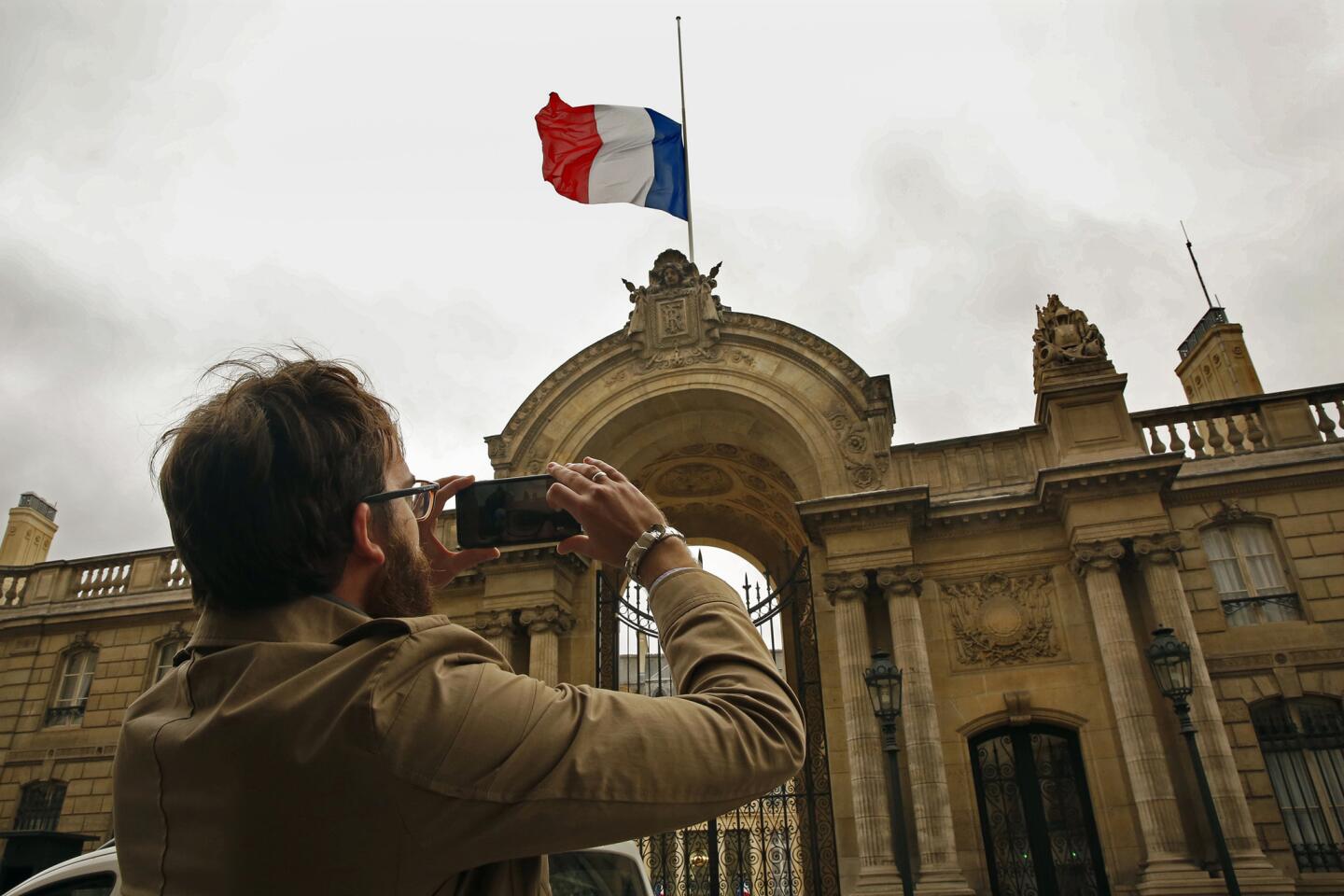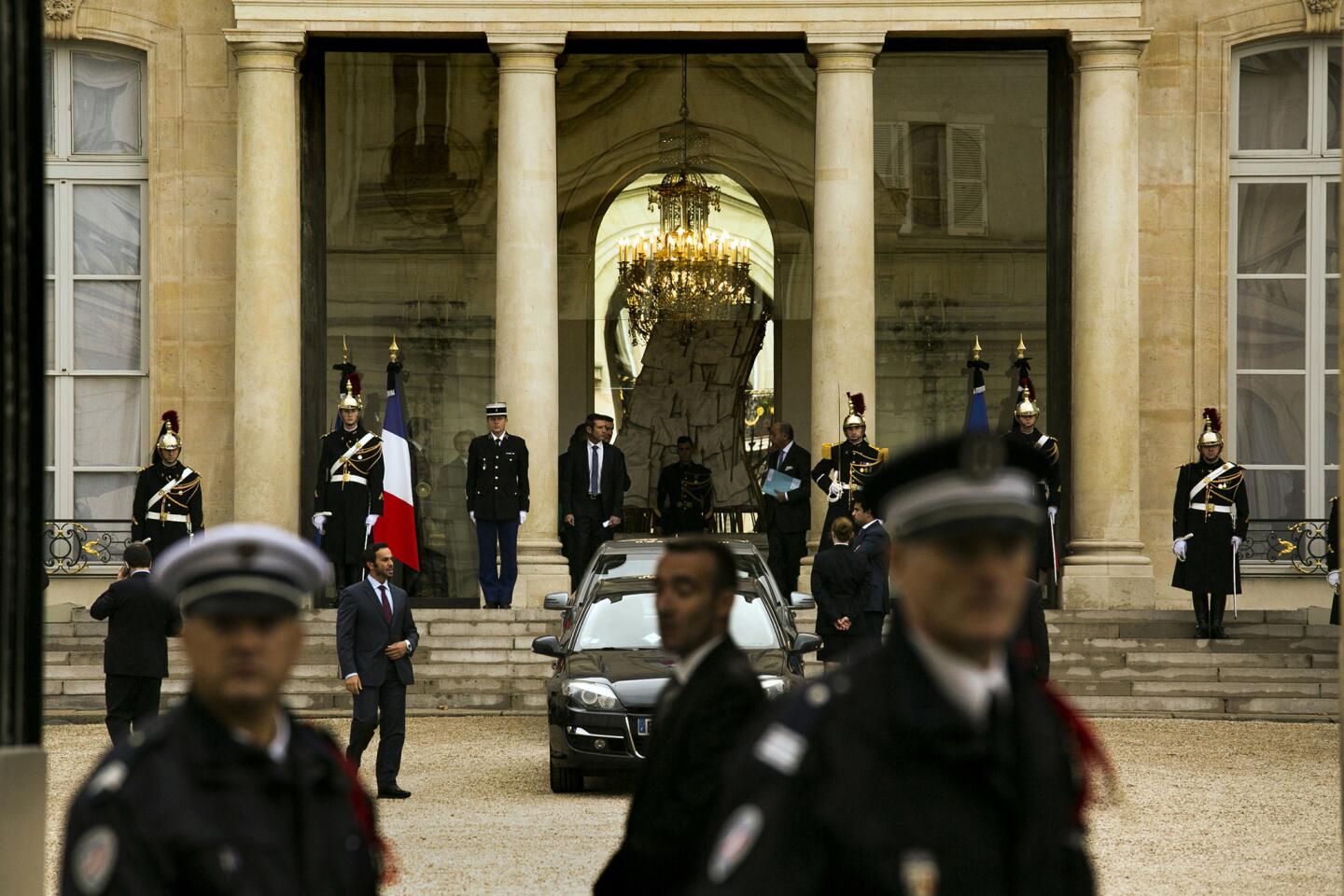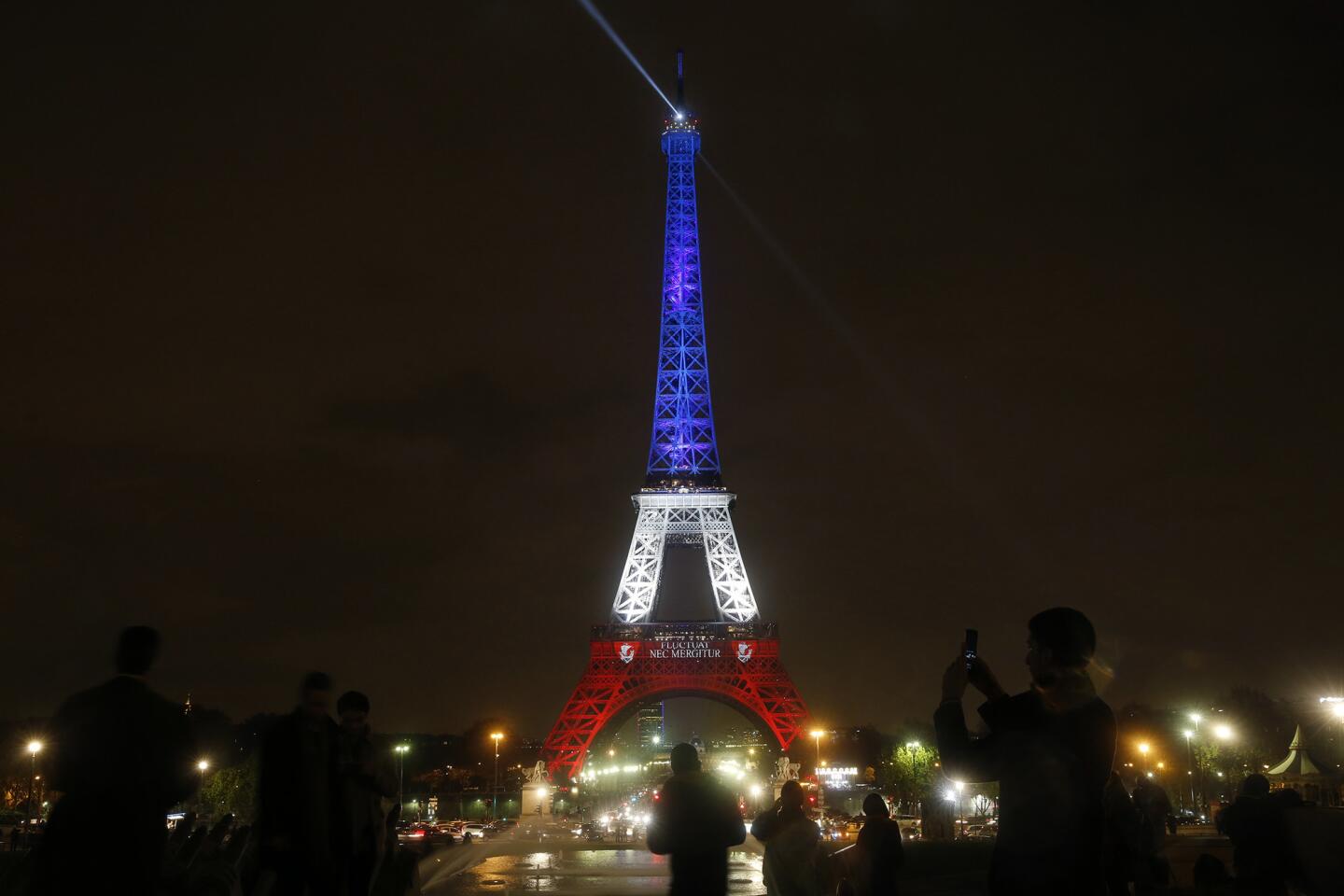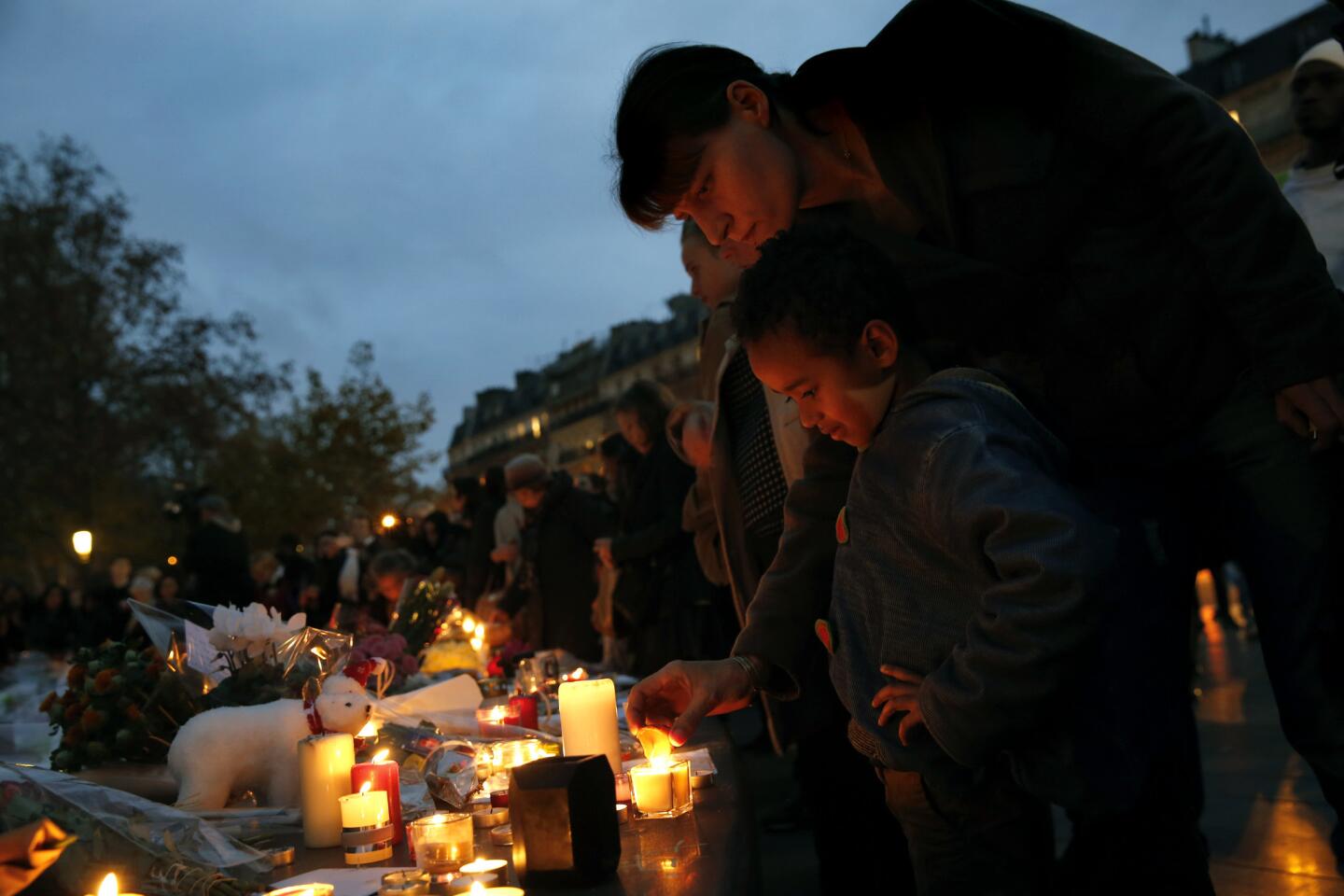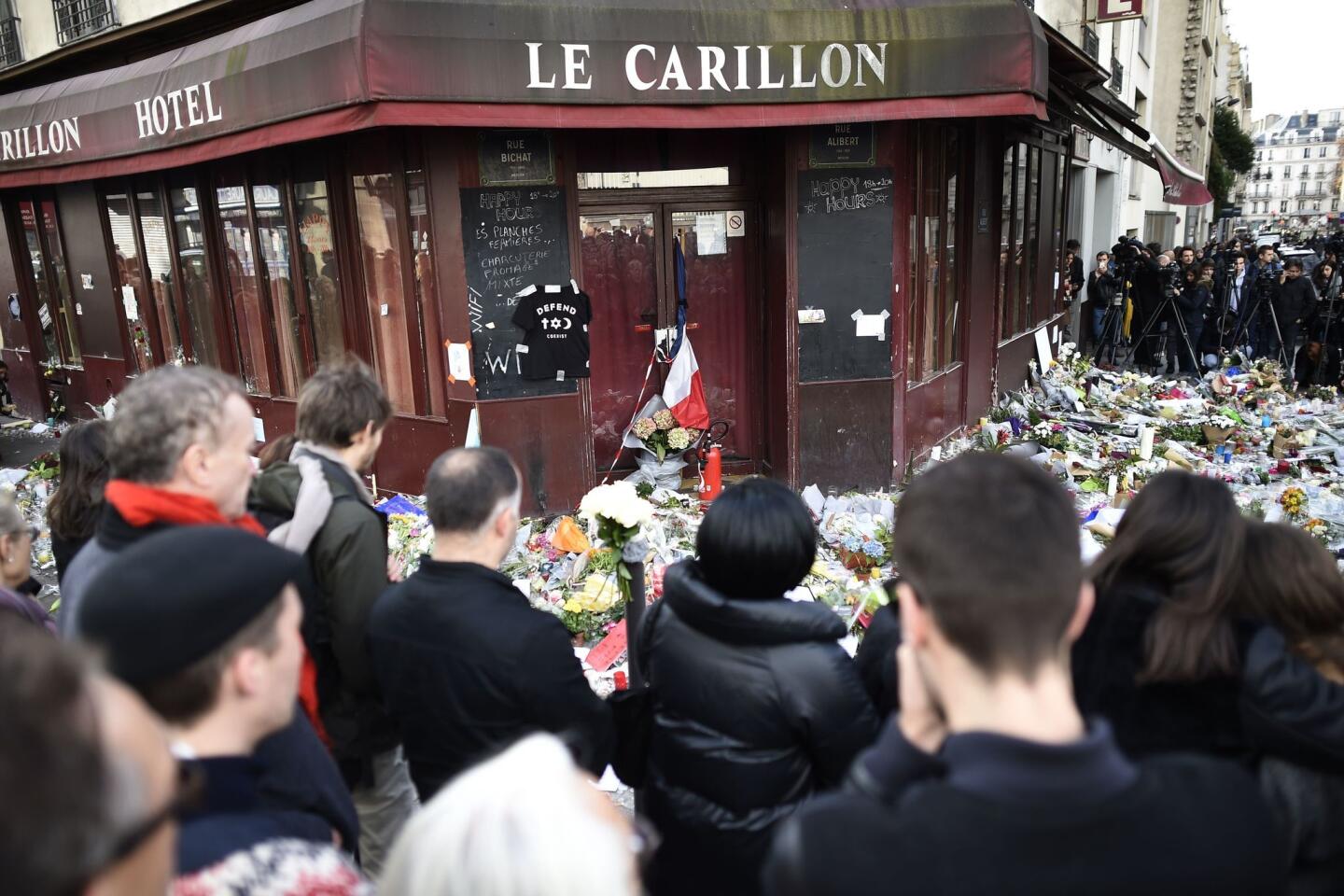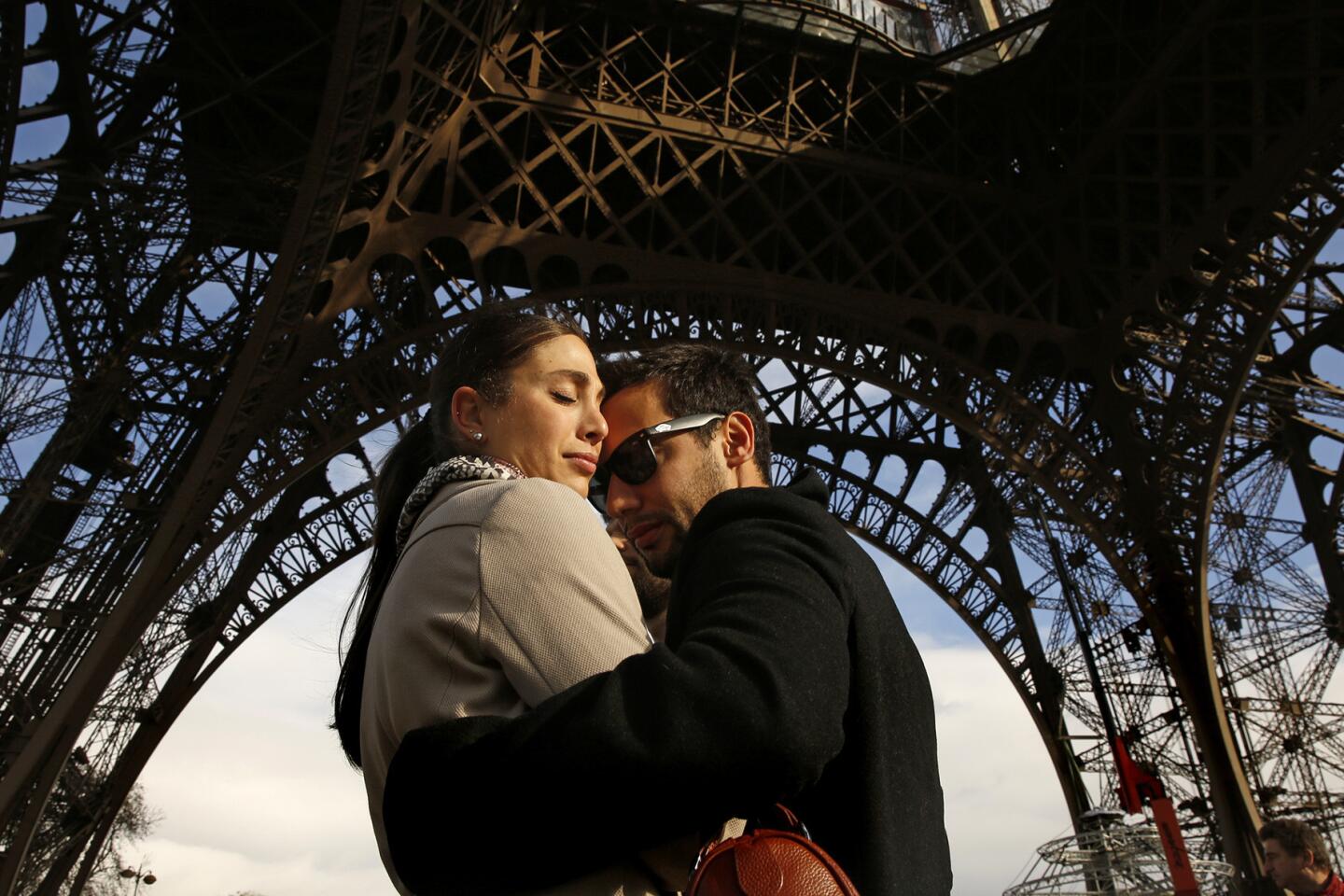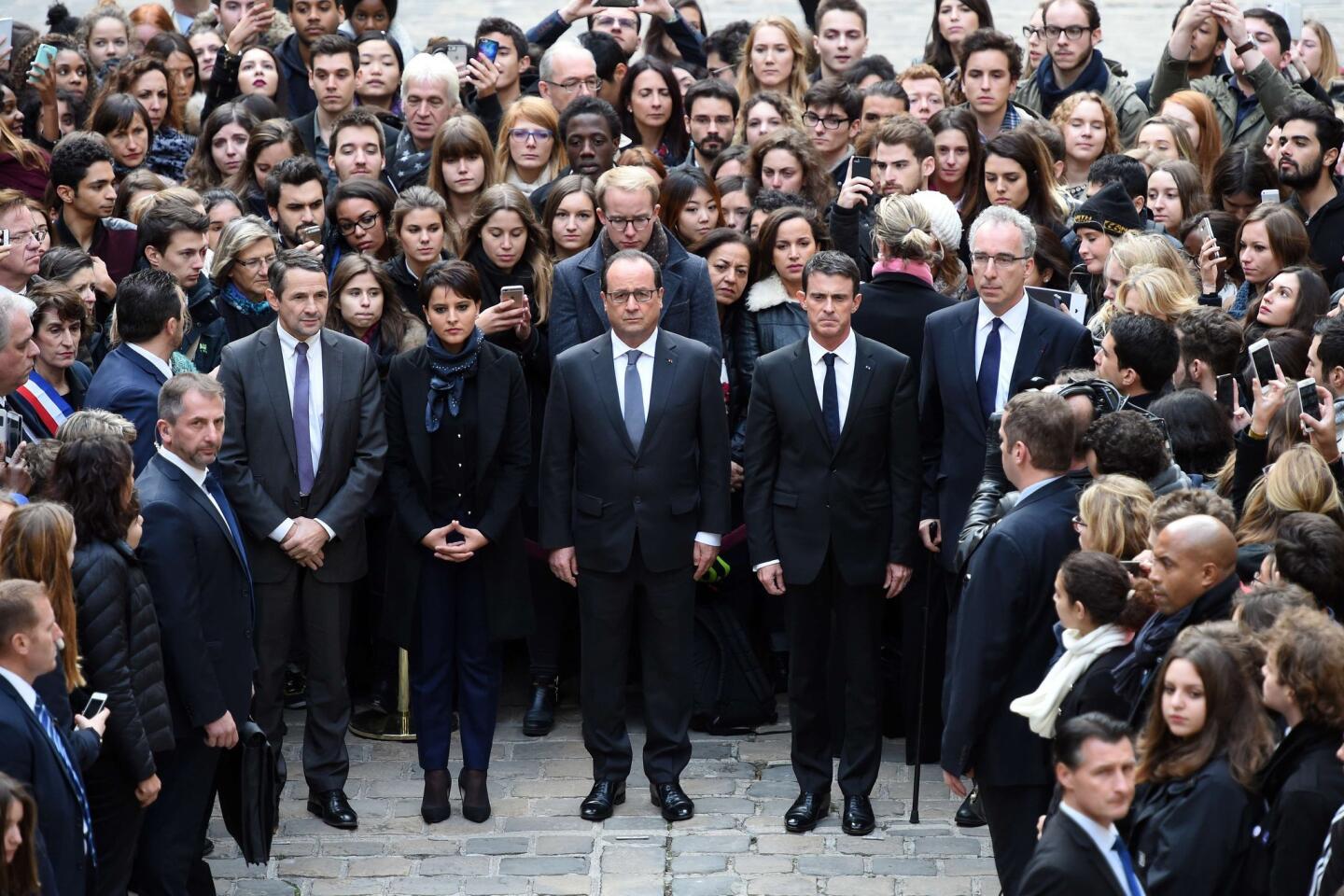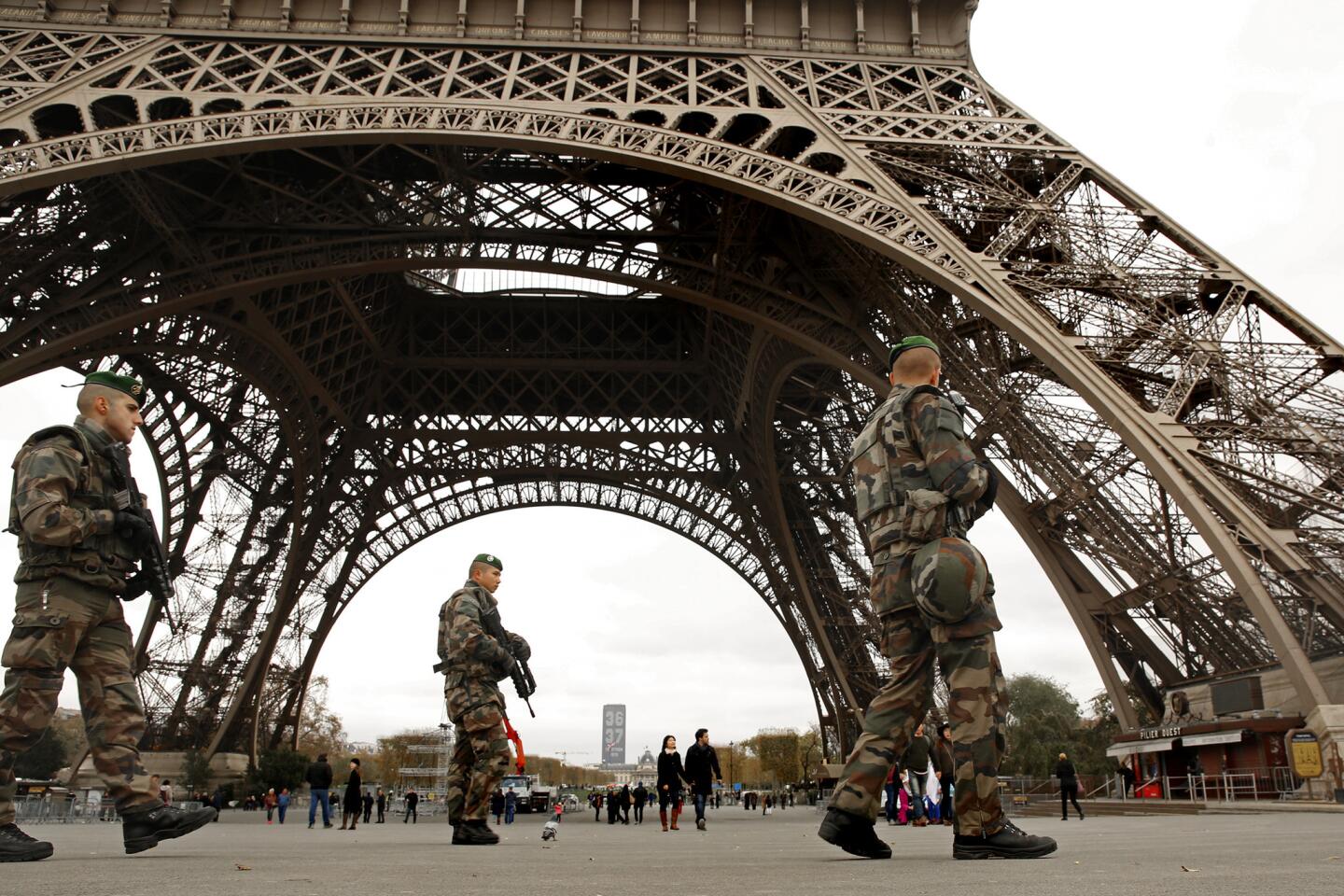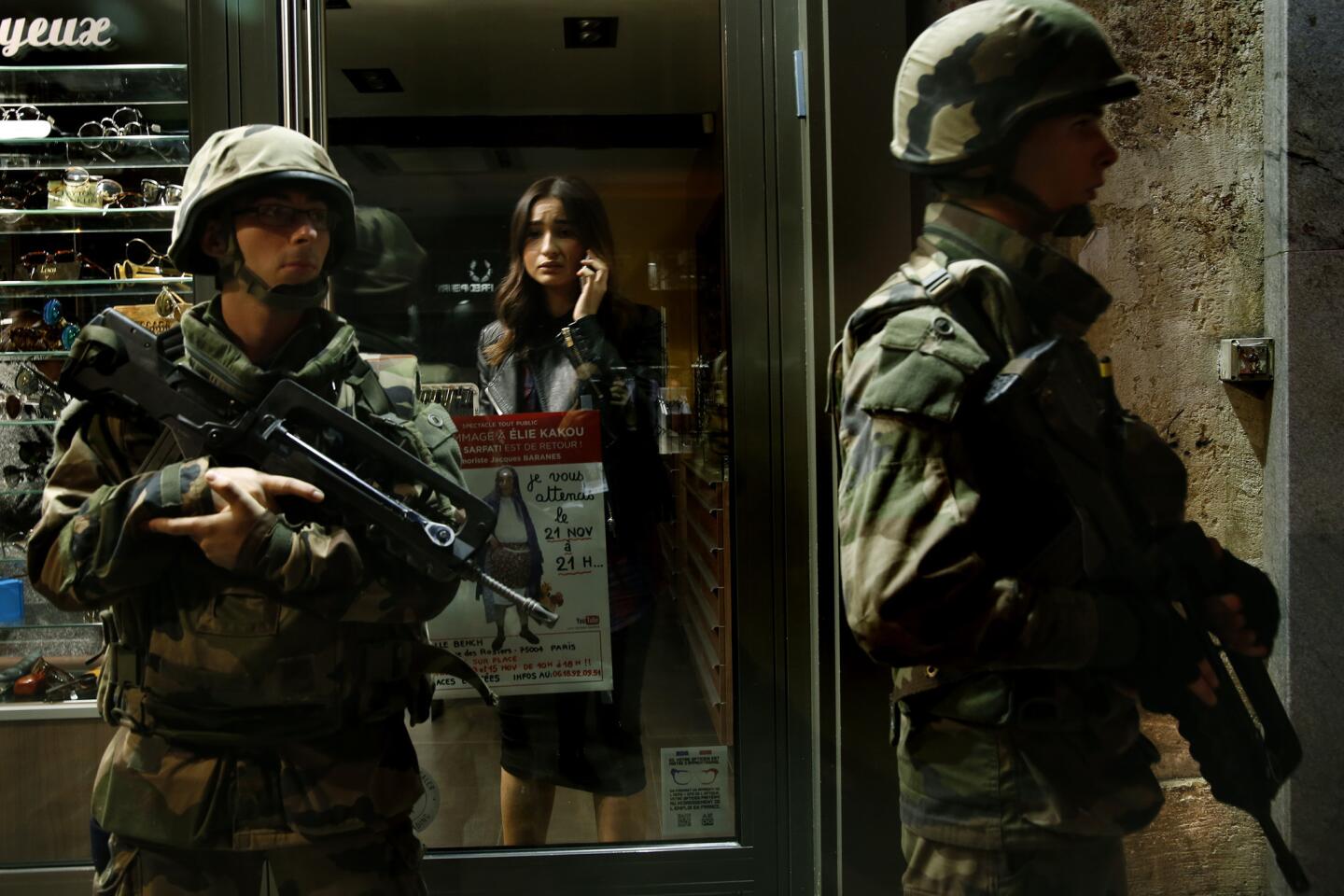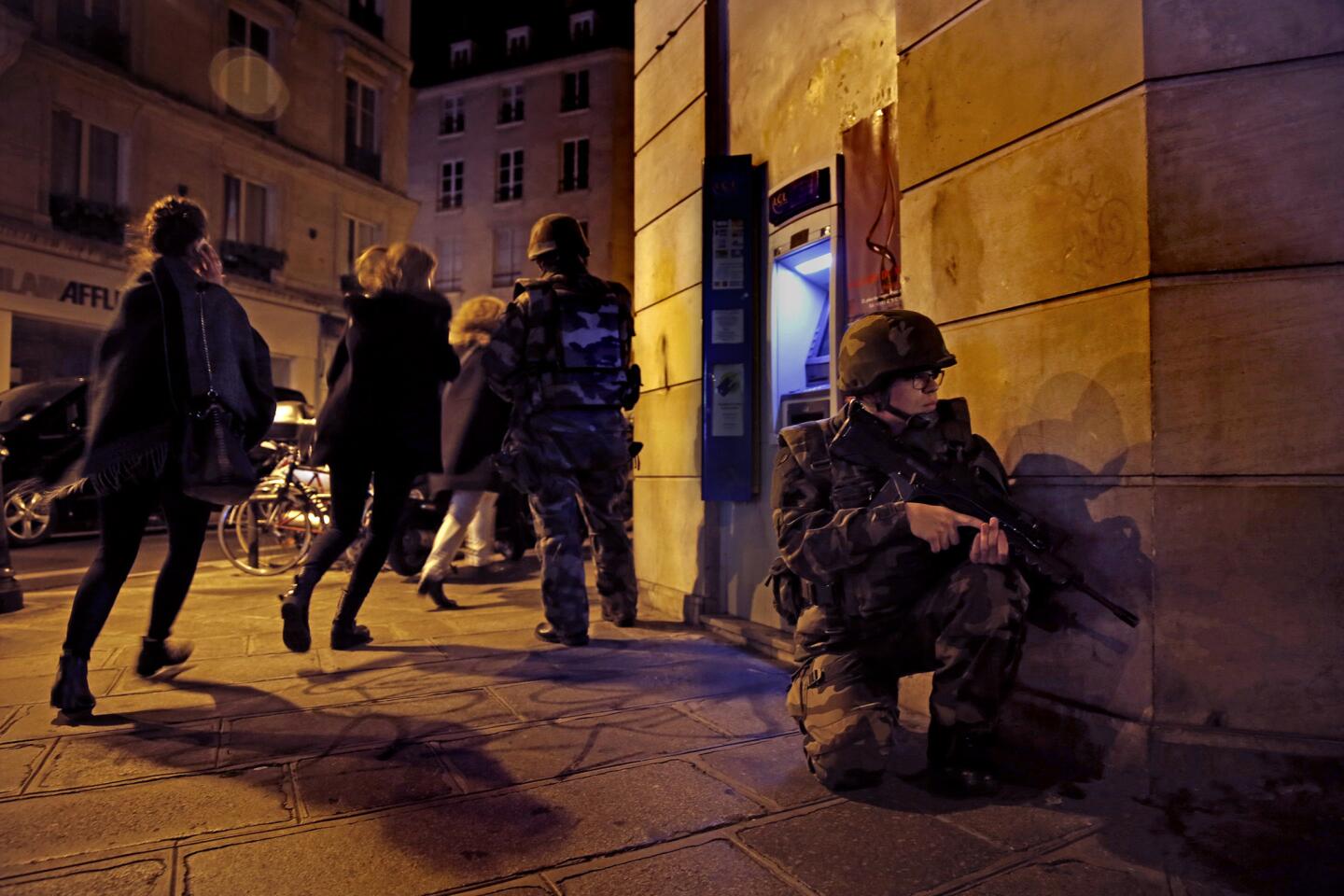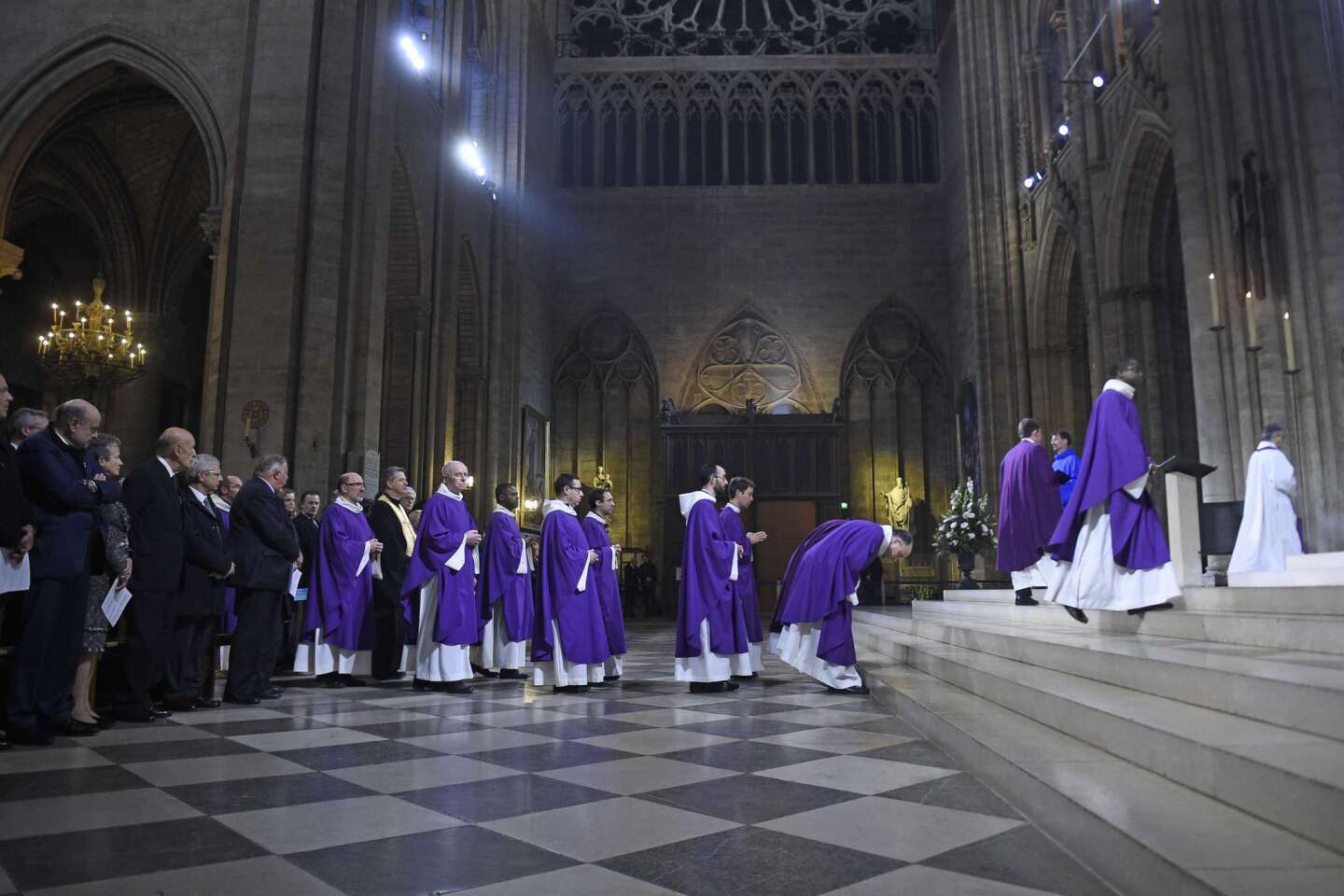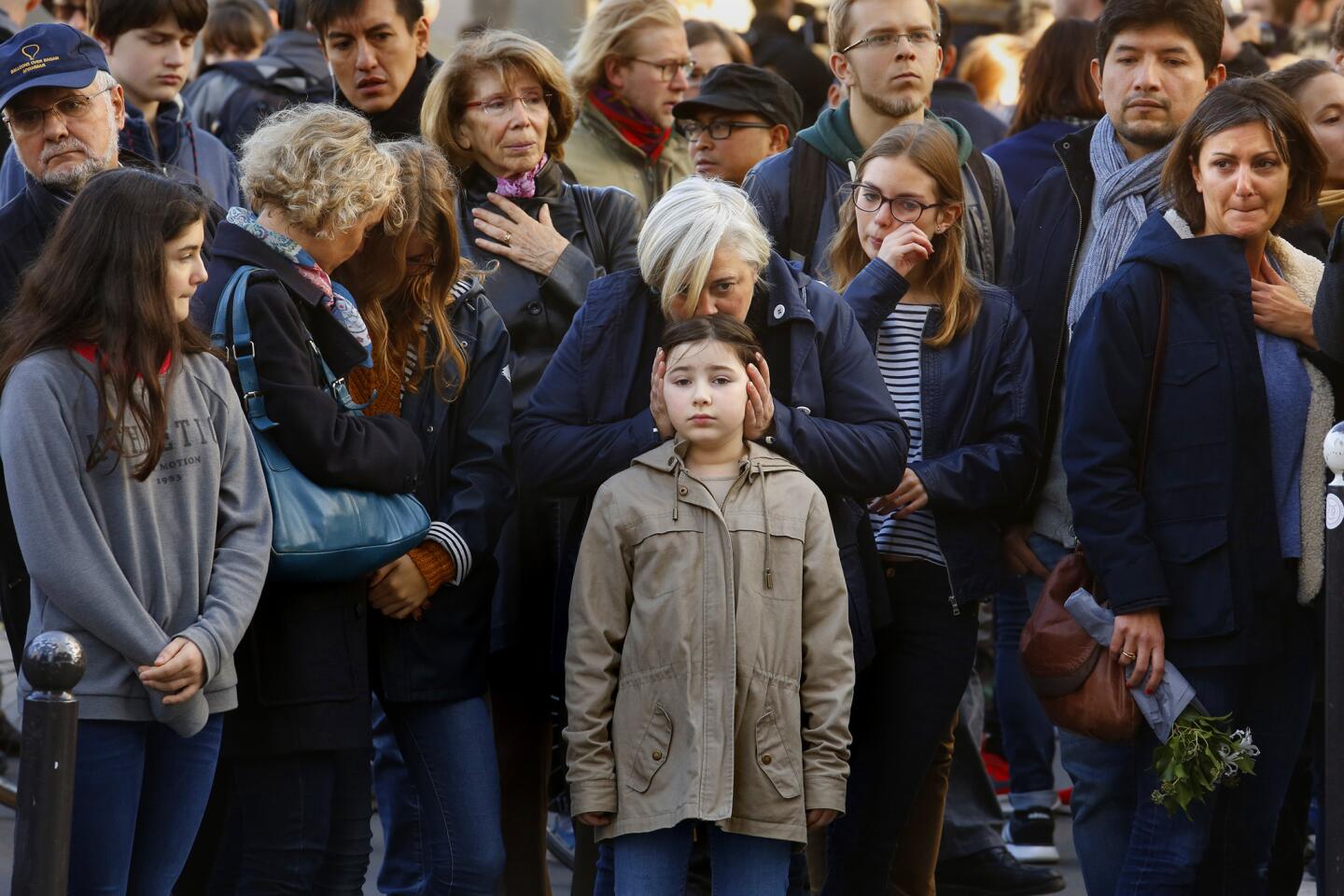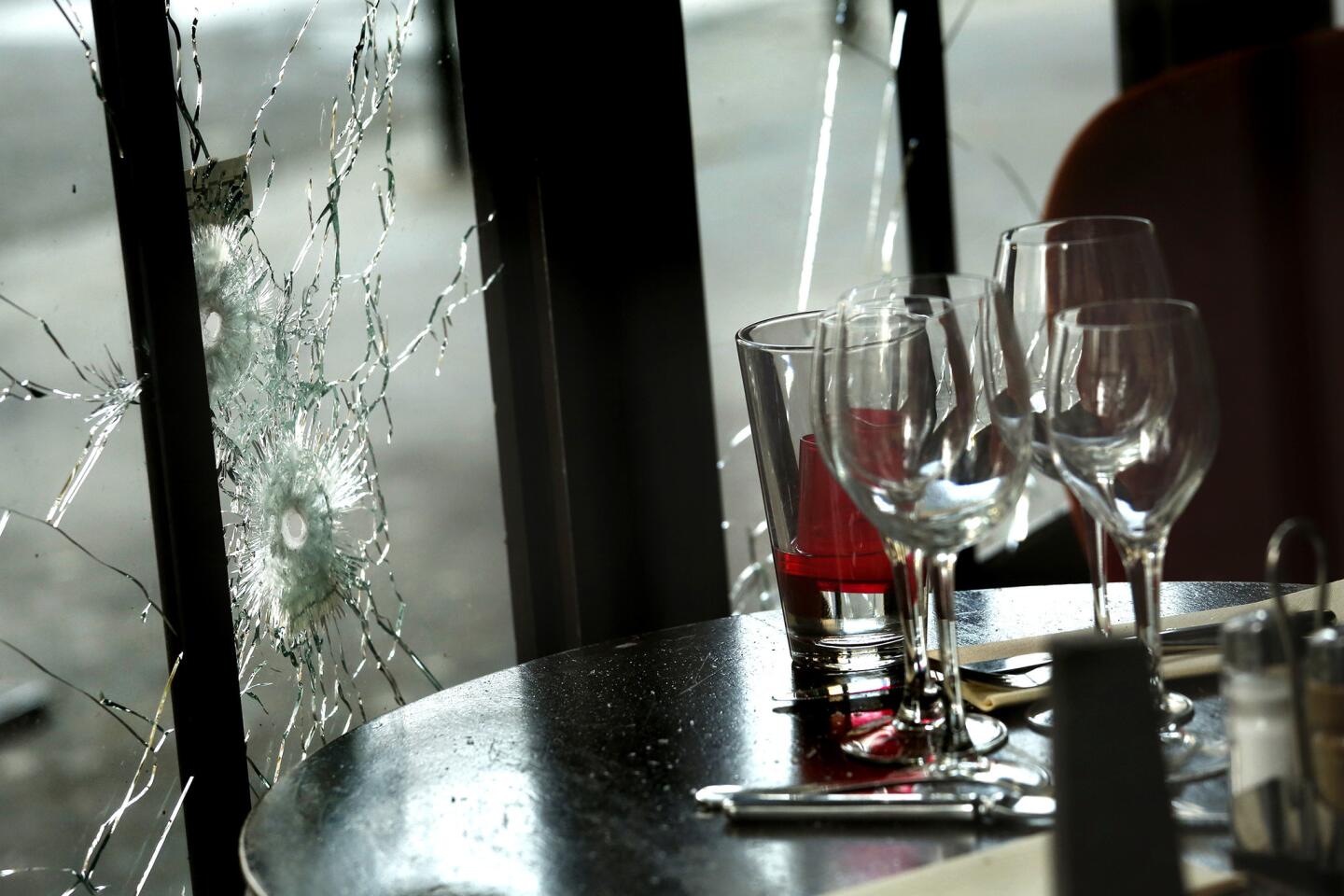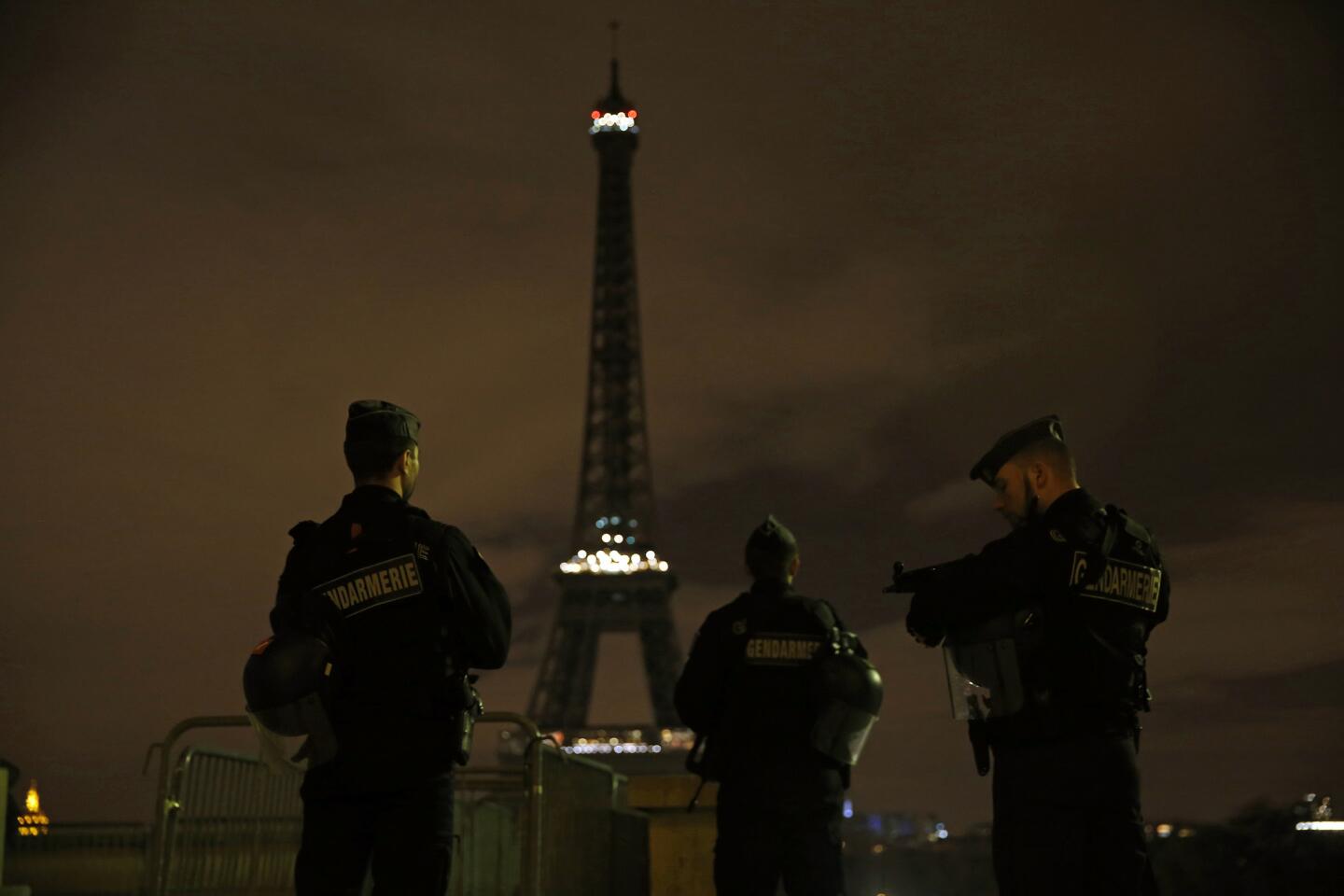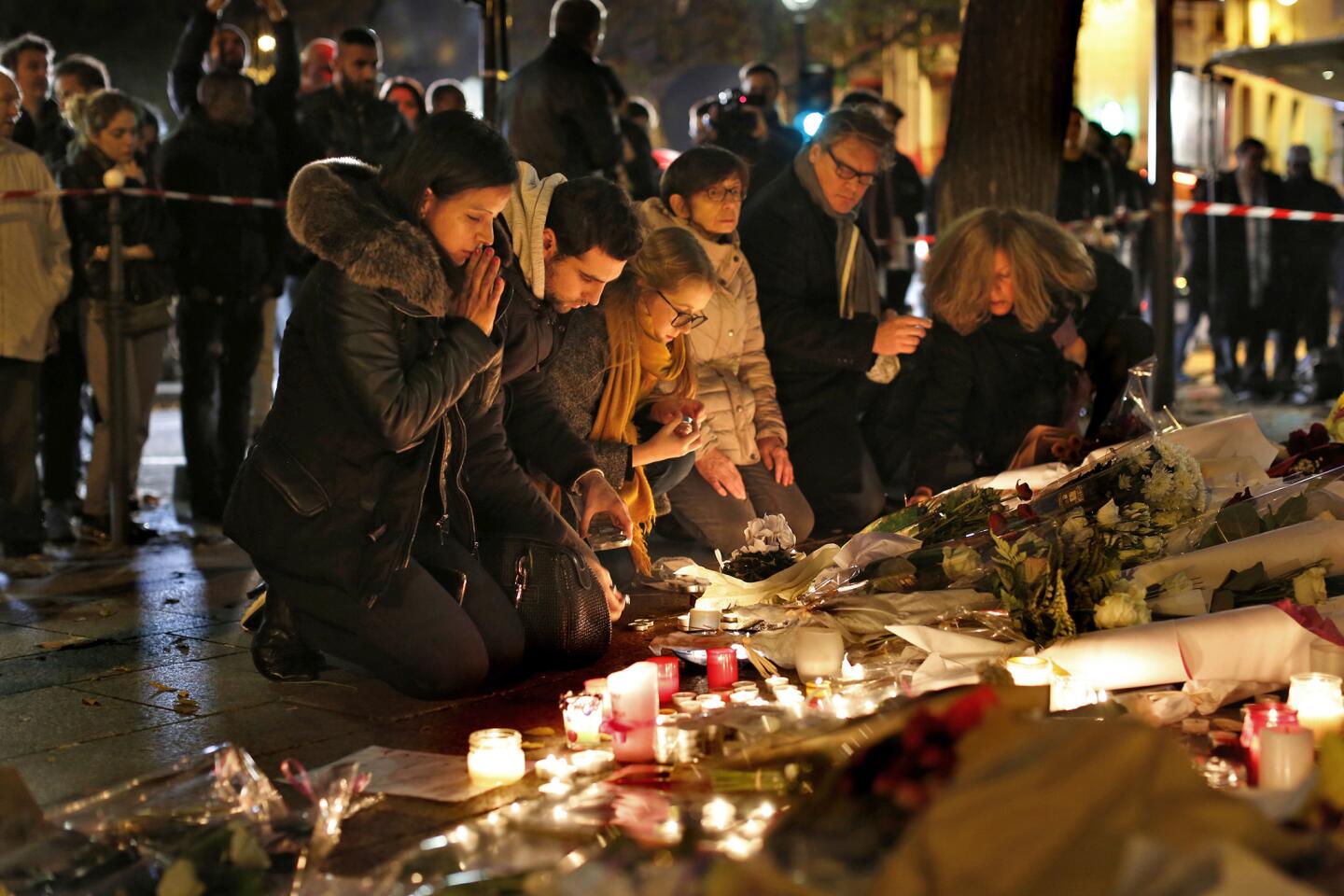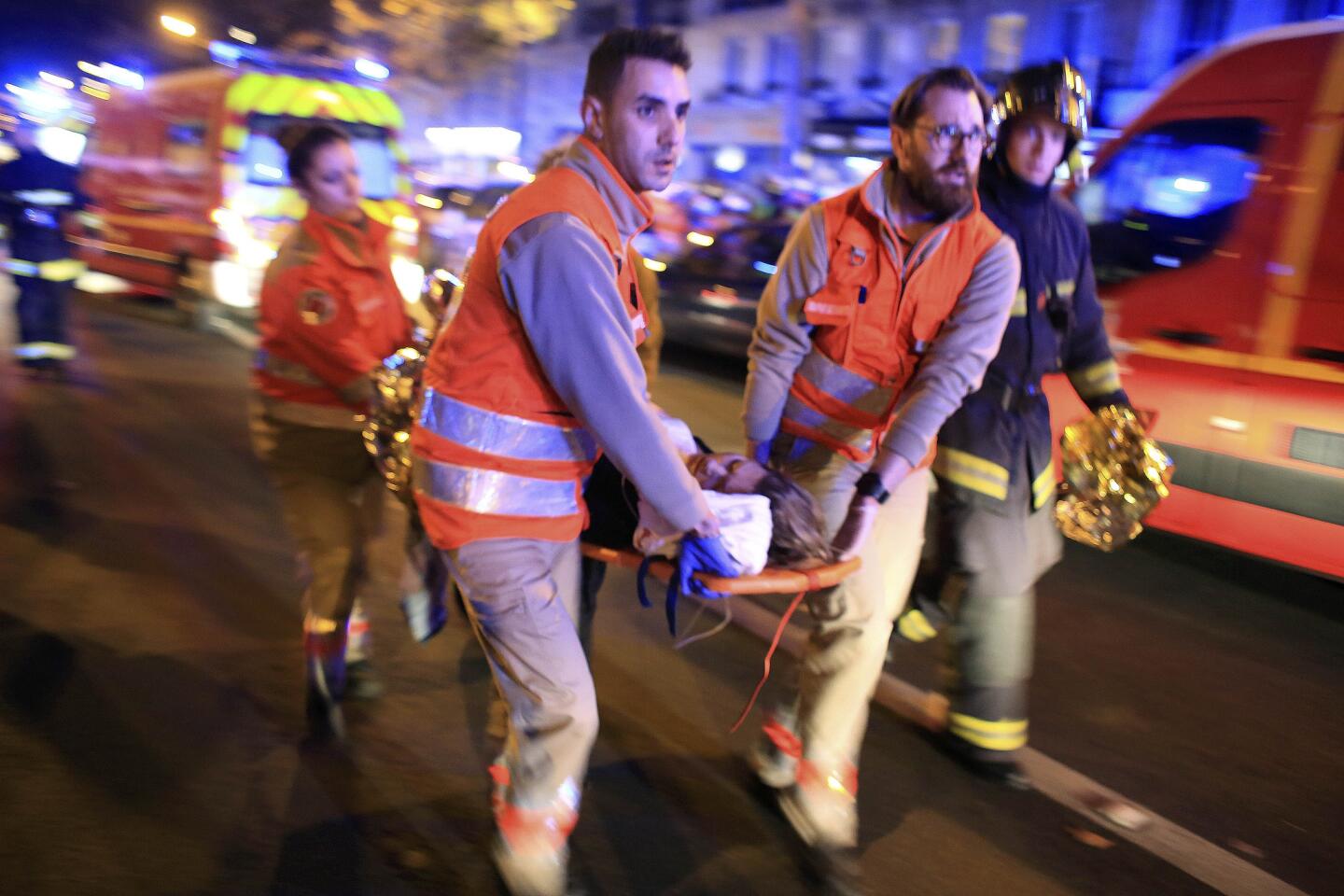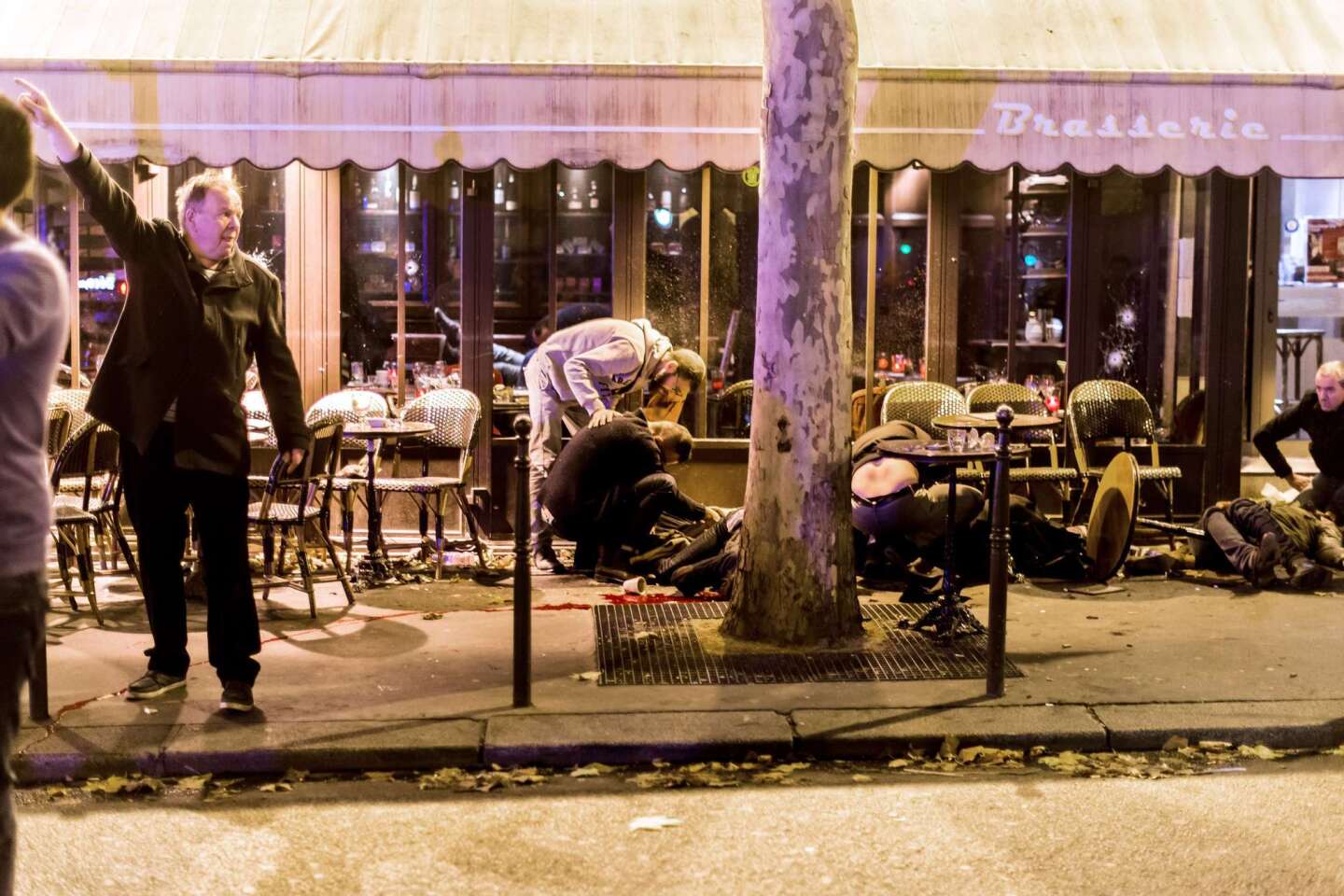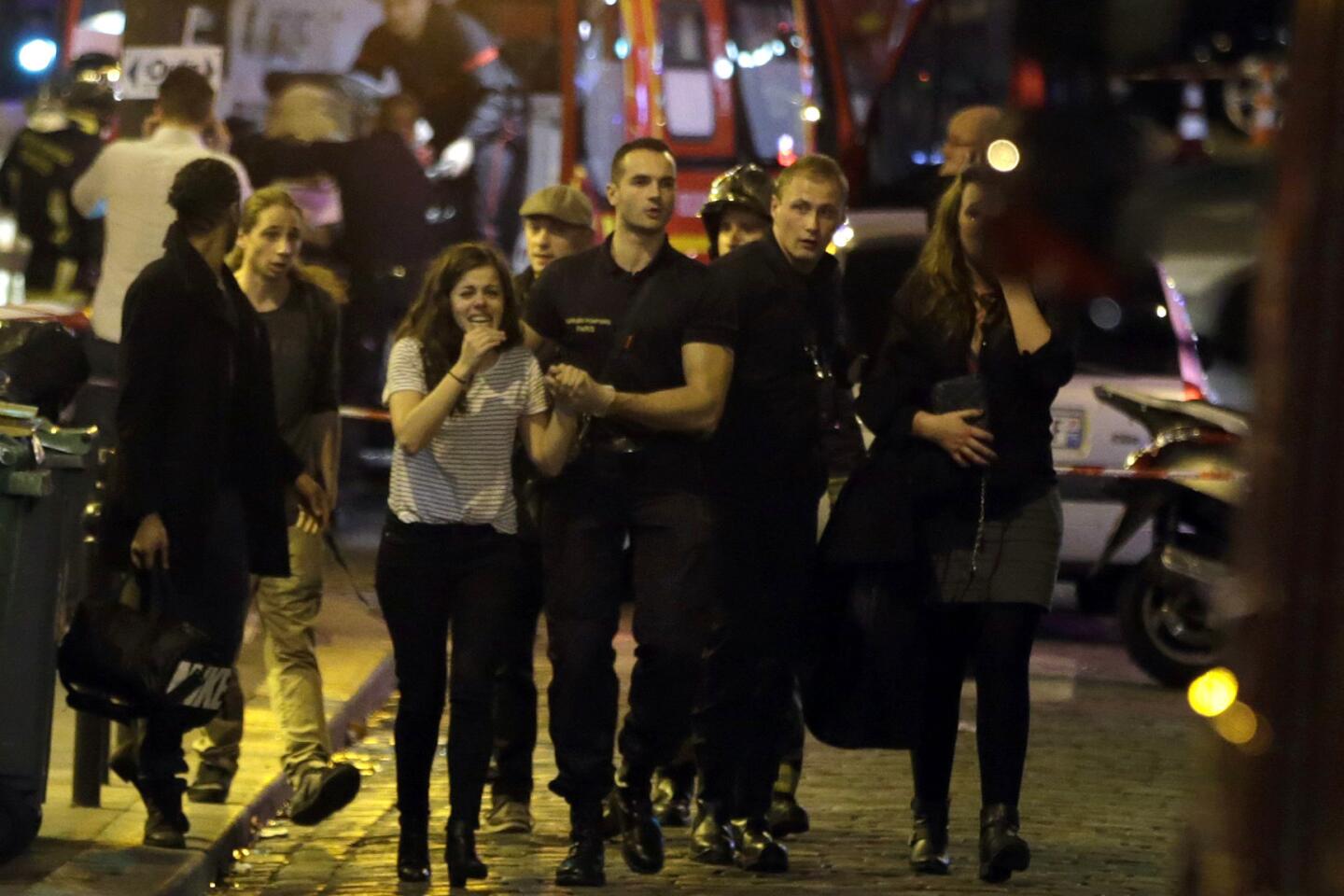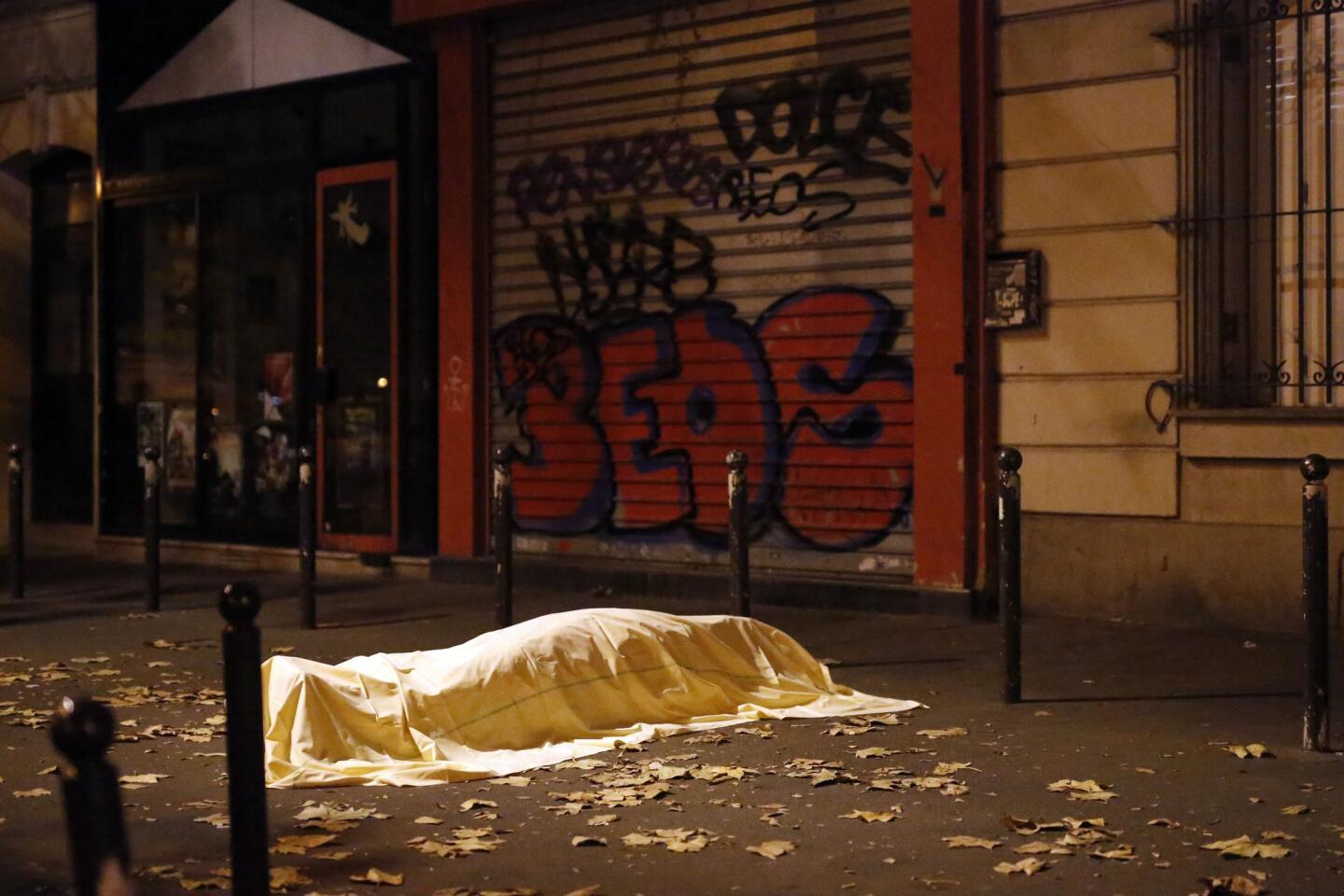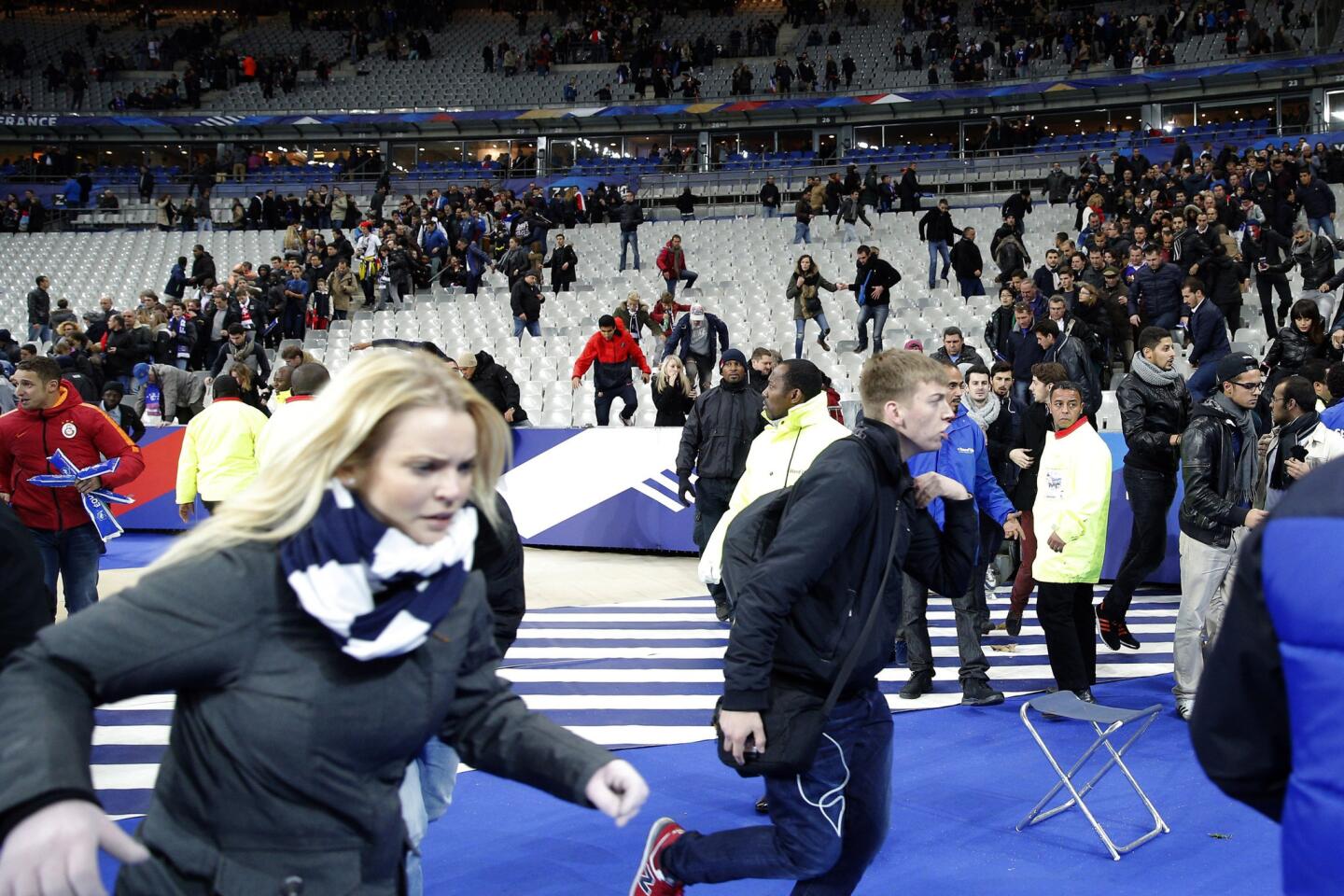As Paris reels, investigators piece together the attackers’ stories
Reporting from Paris — At 9:20 p.m. Friday, an explosion cracked through the raucous din of a soccer game at the Stade de France.
Outside, a terrorist with a suicide belt filled with shrapnel lay dead, and the mortally wounded passerby near him became the first victim of a coordinated act of terrorism that would be the deadliest in Europe in over a decade.
Five minutes later, a black SEAT compact car motored up to Rue Alibert in a vibrant neighborhood in the 10th arrondissement. Assailants with Kalashnikovs fired on an open-air bar and sidewalk café, killing 15 people, before speeding off into the night.
Two more bombs blew up outside the stadium, and the gunmen in the black car continued their gruesome round of the city.
By 9:36, they had shot up more two bustling nightspots. Four minutes later, three different men stormed into a crowded rock concert and opened fire on more than 1,000 people.
When it was over, three hours after the attacks started, 129 people were dead and 352 others were injured.
The militant group Islamic State claimed responsibility, and authorities said evidence suggested at least some of the attackers had come from Syria and Iraq. Six of them detonated suicide vests and a seventh was shot to death by police.
“It is an act of war that was waged by a terrorist army, a jihadist army, by Daesh, against France,” declared French President Francois Hollande, using an Arabic acronym for Islamic State.
“What they do is stiffen our resolve — all of us — to fight back, to hold people accountable, and to stand up for rule of law,” U.S. Secretary of State John F. Kerry said in Vienna as he joined ministers from around Europe and the Middle East to discuss a resolution to the long-running war in Syria.
See the most-read stories this hour >>
Pope Francis called the killings part of a “piecemeal third World War.”
The stunning coordinated assaults, which prompted French officials to step up security on the borders and declare a state of emergency, were the worst terrorist attack to hit Europe since the 2004 Madrid train bombings, which left 191 dead and 1,800 injured.
They are likely to fuel rising popularity of the far right, which has capitalized on anti-immigrant sentiment, and challenge generous attitudes toward the thousands of refugees streaming in from Syria that countries such as Germany have shown.
France’s Muslim community braced for a potential backlash. After attacks in January on the offices of the French satirical magazine Charlie Hebdo, the country saw a spike in acts of anti-Muslim aggression, such as vandalism of mosques. France is home to the highest proportion of Muslims — 7.5% — of any country in Western Europe.
Friday’s operation apparently began with a small extremist cell around Brussels, where French authorities believe the attack was planned and financed, according to two U.S. law enforcement officials who have been advised about the French investigation.
The French newspaper Le Monde reported the terrorists came from the Brussels suburb of Molenbeek, which has been a center for radical Islamists for several years — it was the home of a man who was recently thwarted before he could carry out a passenger-train massacre in Belgium.
French prosecutor Francois Molins said three teams of terrorists, carrying AK-47 assault rifles and wearing explosives vests with identical detonators, appeared to have carried out the attacks.
The bombs killed several of the attackers but only one bystander; the guns, on the other hand, wreaked carnage throughout the City of Light.
At 9:36, the SEAT pulled up to La Belle Equipe, a sidewalk café and restaurant on Rue de Charonne near the Place de la Bastille.
One witness, who identified himself only as Leo, described what followed as “apocalyptic.”
From his apartment just above the scene, Leo said he heard an initial burst of about 50 extremely loud gunshots, followed by another. He looked out the window and saw a car stopped in the middle of the intersection
“Shards of glass were everywhere,” he told RTL Radio. “People were screaming. ... It was an absolutely terrifying slaughter, with bodies spread across the ground.”
When the shooting stopped, he said his wife ran outside to help. Dozens of people were lying on the ground in pools of blood. Someone told her there was a birthday party going on.
Nineteen people died there.
Four minutes later, another team of three attackers with AK-47 assault rifles stormed into the Bataclan concert hall, as some 1,500 people watched a band from Palm Desert called the Eagles of Death Metal.
They started shooting as panicked concertgoers scrambled for the exits or lay low to escape bursts of gunfire. Witnesses said the shooters reloaded several times and sustained the barrage for some 10 minutes.
Molins said 89 people died at the Bataclan. He said the attackers mentioned Syria and Iraq as they fired. When police entered the building, two of the terrorists detonated their suicide vests, and one was shot to death by authorities, he said.
“We are determined to find out who were the attackers, who were the accomplices,” he said. “How they were financed.”
One of the attackers at the Bataclan was a 29-year-old man who has been arrested eight times for “acts against the common good,” but who had not been linked to terrorists, Molins said.
A second Frenchman was stopped and questioned at the Belgian border on Saturday. He had rented a black Volkswagen Polo driven by a man believed to be one of the gunmen who attacked concertgoers at the Bataclan, the prosecutor said.
NEWSLETTER: Get the day’s top headlines from Times Editor Davan Maharaj >>
One of the victims was a 23-year-old design student at Cal State Long Beach. Nohemi Gonzalez of El Monte was part of an international exchange program at the Strate School of Design. Another American, Helen Jane Wilson, told the Associated Press she was shot in the leg and was heading into surgery at L’Hopital Saint-Antoine.
Wilson said she had lived in New Orleans before moving to Paris, where she runs Rock en Bol, a catering company. According to her Facebook page, Wilson is originally from Los Angeles.
Authorities across Europe moved swiftly Saturday to identify possible accomplices to the seven attackers, with Belgian authorities announcing they had made several arrests.
A spokeswoman for Belgian Justice Minister Koen Geens said authorities had arrested “several suspects,” though it was not clear what connection, if any, they had to the attacks.
Geens said the arrests came after the rental car, with Belgian license plates, was seen close to the Bataclan, the magazine De Standaard reported.
U.S. law enforcement officials confirmed that several vehicles, particularly black sedans, have been identified in connection with the case, and that at least one was traced back to Brussels. One was found laden with high-powered weapons, they said; another had been rented.
The sources confirmed that one of the terrorists appeared to be a Syrian, based on his fingerprints and a Syrian passport found near his body. Several others, the sources said, are believed to have come from Iraq.
All of the terrorists who blew themselves up were wearing “vests or belts” heavy with detonators and metal fragments, such as “nails and ball-bearings,” the sources said. Each of the suicide bombs appeared to have been built in a similar fashion and with identical components. Other terrorists were armed primarily with high-powered Russian-made Kalashnikov AK-47 rifles, they said.
“The French police were aware of at least one of them,” said one of the sources, “and had been following him at times but did not think he was operational,” that is, a potential terrorist.
“The others we don’t think were on French police radar,” the source said.
U.S. authorities believe the suicide blasts during a soccer game at the packed Stade de France, the national stadium just north of Paris, were meant to “send a statement” because the two teams participating — France and Germany — are Christian countries and because the French president was attending the match.
“But the killing of hostages at the theater was a slaughter,” said one of the U.S. sources. “It was about a high kill number.”
Islamic State said in a statement that “youth who divorced from the world and went to their enemy” had targeted “the hearts of the Crusaders” and unleashed “horror in the middle of their land.”
It said the attacks were in retaliation for French airstrikes on Islamic State-controlled territory in the Middle East, and that France would remain at the “top of the list” of its targets.
French officials, including Hollande, have publicly blamed the attacks on Islamic State.
But the U.S. sources said the multiple sites and soft, crowded targets in the attacks are indicative of Al Qaeda rather than Islamic State. They stressed that authorities still are trying to pin down which organization was behind the attacks.
“Who planned this? Who paid for this?” said one source. “That’s what we want.”
Chu reported from Paris, Serrano from Washington and Mozingo and Finnegan from Los Angeles. Times staff writers Sarah Parvini and Alexandra Zavis contributed to this report.
ALSO
Paris attacks: LAPD monitoring ‘critical sites’ as precaution
A look at some previous extremist attacks in Western Europe
Eagles of Death Metal band members said to be safe after deadly Paris attacks
More to Read
Sign up for Essential California
The most important California stories and recommendations in your inbox every morning.
You may occasionally receive promotional content from the Los Angeles Times.
